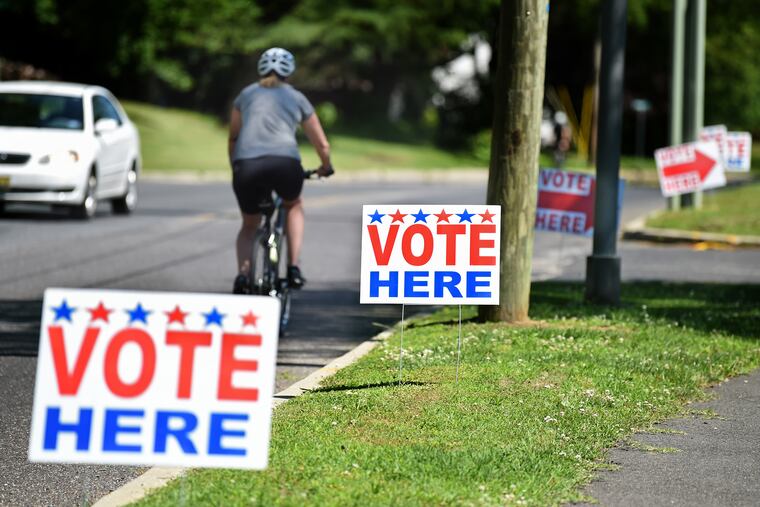2019 was a big year for voting rights and election reform in Pennsylvania and New Jersey
Voting rights are having a moment, even in Pa. and N.J., which for a long time were in the middle of the pack and falling behind when it comes to ballot box access.

Voting rights are having a moment. Even in Pennsylvania and New Jersey, which for a long time were in the middle of the pack and falling further behind when it comes to access to the ballot box.
Just look at 2019.
In Pennsylvania, Democrats and Republicans negotiated major changes to the state’s outdated and restrictive electoral system, the biggest reform in decades, that include allowing no-excuse absentee voting and extended voter registration deadlines.
In New Jersey, a years-long campaign to extend the right to vote to people in the criminal justice system hit a major milestone, with lawmakers and the governor agreeing to allow people on parole and probation to vote.
» READ MORE: New Jersey might give 80,000 people on probation and parole the right to vote. Advocates want more.
Those changes alone expand the right to vote and make it more accessible. And they come after a handful of other changes in the two states. Pennsylvania allowed online voter registration. And New Jersey implemented automatic voter registration, in which eligible voters are registered by default when they interact with state agencies such as DMVs unless they opt out.
All this after years in which talk far exceeded action.
“Voting rights is becoming a more and more high-profile issue,” said Max Feldman, a voting rights attorney at the Brennan Center for Justice at New York University.
Some states have moved to restrict access to the ballot, Feldman said — and Pennsylvania was among them, with its hotly contested and ultimately failed attempt to require all voters to show identification at the polls. Others moved rapidly this decade to dramatically reshape how ballots are cast, counted, and translated into political representation.
Pennsylvania and New Jersey have been somewhere in the middle, at first refusing to budge and then enacting more and more change.
It’s been quite the journey, advocates and experts said. And while many were wary of making predictions, all expressed hope that the door to change will remain open.
“It’s been such a wild last few months, and we are really excited for the changes that have moved through,” said Sarah Fajardo, policy director at the American Civil Liberties Union of New Jersey. “And we’re starting to gather force for the next few months.”
» READ MORE: New Jersey wants to expand voting access and give new voice to marginalized populations
People across the country are talking about voting rights and elections in a new way, interested in once-wonky topics such as gerrymandering, ranked-choice voting, absentee ballots, and the Electoral College.
“We’ve seen the importance of Pennsylvania in how close elections are, and both sides want to make sure every vote that can go their way goes their way, so I think both sides have an interest in making sure as many eligible voters vote as possible,” said Sara Mullen, policy director of the ACLU of Pennsylvania.
As public awareness has grown, so has activism. This decade saw increased engagement with good-government groups and the rise of new movements, including the grassroots Fair Districts PA group, which seeks to prevent partisan gerrymandering by changing how Pennsylvania’s political maps are drawn.
That kind of public pressure has helped push lawmakers toward adopting changes, said Jesse Burns, executive director of the League of Women Voters of New Jersey.
“What you’re seeing is a shift of power,” she said. “When you make elected officials more responsive to voters, they need to care about things like accessibility [of the vote]. … Voters are being more and more involved and vocal, and elected officials don’t have any choice but to be more responsive to that.”
At the same time, Pennsylvania and New Jersey don’t have a direct citizen-initiative process that allows voters to propose and approve changes to the law. And that’s restricted the ability to push for greater change, said David Thornburgh, head of Philadelphia-based good-government group Committee of Seventy.
So while voters in other states have gone around their legislatures to enact reform with broad bipartisan support, voters in Pennsylvania and New Jersey remain dependent on lawmakers.
» READ MORE: Voting rights and election reform are hot topics with Pa. lawmakers. It’s a moment three decades in the making.
Experts and advocates are clear-eyed about the fact that voting rights issues are often fought along partisan lines — with Republicans generally concerned about voter fraud and election security, and Democrats focused on expanding access and participation. They worry the partisan divide will hurt future attempts to improve the voting system.
“It’s very unfortunate, and it is a real danger,” Mullen said. “People should really be thinking about how to make the system fairer, not about what benefits my side the most.”
Still, lawmakers this year came together to pass changes and Thornburgh said he hopes it can happen again.
“People change, circumstances change, elections come and go,” Thornburgh said. “So I don’t know how long that window’s going to be and whether that means there’s sort of a new era of reform and cooperation. All I know is, the window’s open and this is a time to get things done.”